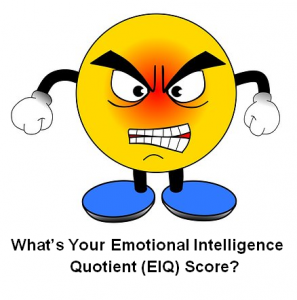 There’s strong psychological evidence that your emotional intelligence is more important than your cognitive intelligence when it comes to practical life skills. Repeated clinical studies show your emotional quotient (EQ) score should outweigh your intelligence quotient (IQ). EQ is what you need to build positive relationships, improve personal happiness and achieve professional accomplishments. Having a high EQ gives you a nice advantage in the everyday world. It’s the old people-smarts vs book-smarts thing.
There’s strong psychological evidence that your emotional intelligence is more important than your cognitive intelligence when it comes to practical life skills. Repeated clinical studies show your emotional quotient (EQ) score should outweigh your intelligence quotient (IQ). EQ is what you need to build positive relationships, improve personal happiness and achieve professional accomplishments. Having a high EQ gives you a nice advantage in the everyday world. It’s the old people-smarts vs book-smarts thing.
A big cognitive intelligent quotient (IQ) indicates you have an excellent learning ability. However, having an elevated emotional quotient (EQ) suggests your ability to function is strong. It’s like the Force is with you. No doubt you’ve met someone with an apparently high IQ who pretty much pissed off everyone. Then, you probably know someone who isn’t particularly “smart” but is exceptionally popular and prosperous.
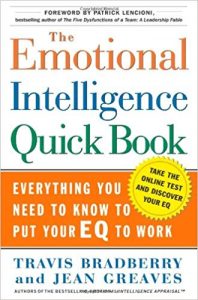 The best definition of emotional intelligence is the level of capability you have to recognize your own emotions, as well as those of others, and use this information to guide your thinking, behavior and reactions to positively adapt to your environment and achieve your goals. People with high EQs typically excel in both interpersonal and intrapersonal interactions. Simply put, having a strong emotional quotient lets you interact well within society and within yourself.
The best definition of emotional intelligence is the level of capability you have to recognize your own emotions, as well as those of others, and use this information to guide your thinking, behavior and reactions to positively adapt to your environment and achieve your goals. People with high EQs typically excel in both interpersonal and intrapersonal interactions. Simply put, having a strong emotional quotient lets you interact well within society and within yourself.
I recently read a great little work called The Emotional Intelligence Quick Book — Everything You Need to Know to Put Your EQ to Work. It’s written by two Psychology PhDs, Jean Graves and Travis Bradberry, and it’s endorsed by no less than Brian Tracy, Stephen Covey and the Dalai Lama himself. The book also comes with a credible online EQ appraisal which I took. I’m happy to share my score and offer you the opportunity to do so, too. But first, let’s see how emotional intelligence works in your brain and hear the story of poor, unfortunate Phineas Gage.
Who was Phineas Gage and What Happened to his Brain?
You’ve probably never heard of Phineas Gage. I hadn’t either. He was a construction foreman working on the Burlington Railroad in Vermont back in 1848 when he suffered a bizarre injury during a dynamite mishap. Old Phineas was tamping a charge when his steel bar ignited a spark. The premature explosion blew the bar straight through Phineas’s head. The bar’s point entered his left eye and traversed his frontal lobe, then exited through the top of his skull.
 Phineas didn’t die, but the accident sure as hell changed his personality. Before the blast, Phineas was a likeable guy. Afterward, he became so emotionally unstable that he was unable to function with others. Phineas became a vulgar misfit who acted completely inappropriate including exhibiting lewd acts, debauchery, drunkenness and flying into rage fits as well as suffering depression bouts mixed with maniacal highs. Today, we’d say he turned into a complete and utter asshole.
Phineas didn’t die, but the accident sure as hell changed his personality. Before the blast, Phineas was a likeable guy. Afterward, he became so emotionally unstable that he was unable to function with others. Phineas became a vulgar misfit who acted completely inappropriate including exhibiting lewd acts, debauchery, drunkenness and flying into rage fits as well as suffering depression bouts mixed with maniacal highs. Today, we’d say he turned into a complete and utter asshole.
And today, we realize what medically and psychologically happened to Phineas Gage’s emotional state when his left frontal lobe was demolished. As a human, your brain’s hard-wired to experience emotions. It’s what gives you a flight or fight response in emergencies as well as the moderation experience of joy, sorrow and neutrality not to mention keeping your behavior in check.
You absorb environmental information via your brainstem, medulla, pons and midbrain sections. Your sensory input gets processed and delivered through your limbic system where it’s passed to your frontal lobes for fine-tuning. It’s your frontal lobe that helps you decide how you’re going to respond to an emotional stimulus.
It’s the back-and-forth communication between the front of your brain and the base that’s the physical source of emotional intelligence. You can compare this process to an information highway. If your limbic system is a windy, two-lane road you’re likely to have a low score on your EQ appraisal. If your path is an eight-lane superhighway, you’re bound to score high.
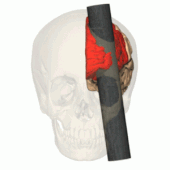 With Phineas’s frontal lobe half-gone, he was fueled by raw, unprocessed emotion. He lost his ability to reason about, and react to, his feelings. Everything Phineas encountered resulted in a rash emotional response. He had zero ability to manage his feelings or even understand their presence. Every waking hour, Phineas Gage was overcome with emotions, and he reacted outside social norms. It was like the guy was constantly chased by a mind-frigging tiger.
With Phineas’s frontal lobe half-gone, he was fueled by raw, unprocessed emotion. He lost his ability to reason about, and react to, his feelings. Everything Phineas encountered resulted in a rash emotional response. He had zero ability to manage his feelings or even understand their presence. Every waking hour, Phineas Gage was overcome with emotions, and he reacted outside social norms. It was like the guy was constantly chased by a mind-frigging tiger.
The Emotional Intelligence Quick Book
Fortunately, you likely have an intact brain even if you do get somewhat emotional from time to time. Emotions are a good thing, though, and I’m happy to report you can easily learn to work them to your advantage. Unlike cognitive intelligence where you’re born with a fixed IQ, your emotional intelligence state is flexible. That’s the message the psychologists deliver in The Emotional Intelligence Quick Book.
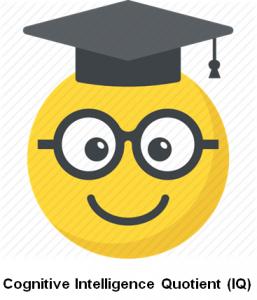 This quick book opens by stating that not education, not experience, not knowledge and not intellectual horsepower adequately predict why one person succeeds in life and another doesn’t. The writers say something else goes on in society that doesn’t account for a high cognitive IQ. That’s your emotional intelligence, but it’s much harder to identify and qualify an EQ than an IQ.
This quick book opens by stating that not education, not experience, not knowledge and not intellectual horsepower adequately predict why one person succeeds in life and another doesn’t. The writers say something else goes on in society that doesn’t account for a high cognitive IQ. That’s your emotional intelligence, but it’s much harder to identify and qualify an EQ than an IQ.
IQ tests are objective ventures. They’re quantified processes where you’re essentially examined on how well, and how fast, you figure out challenges with clearly right and wrong answers. If you get every question right within a preset time, then you’re considered to be a pretty bright light. If you don’t, well…
The Emotional Intelligence Quick Book doesn’t call their examination process a test. They refer to it as an appraisal because it’s not locked into right and wrong. Rather, the appraisal offers you multiple-choice selections based on emotional stimuli. It’s sort of an always-sometimes-never type of response they ask you to make.
The book’s opening also points out most of us focus our self-improvement energy pursuing knowledge, education and experience to boost our performance. That’s fine and honorable, but the equation is missing another crucial part. That’s having a full understanding of our emotions, not to mention others’ emotions, and how this mix influences our daily lives.
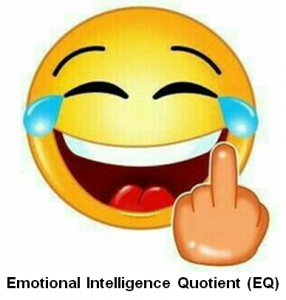 There’s a gap between the popularity of measuring IQ and the misunderstanding of EQ. Most people don’t know what EQ really is and tend to dismiss it as a personality structure like being gregarious or charismatic—sort of an introvert/extrovert thing. Also, many people don’t understand that EQ is a state that can be improved.
There’s a gap between the popularity of measuring IQ and the misunderstanding of EQ. Most people don’t know what EQ really is and tend to dismiss it as a personality structure like being gregarious or charismatic—sort of an introvert/extrovert thing. Also, many people don’t understand that EQ is a state that can be improved.
It starts with recognizing how emotional intelligence functions and assessing your strengths and weaknesses. This is what the EQ appraisal does. It helps you manage your life so you can fully leverage your cognitive intelligence qualities. Here’s how the appraisal works.
How an Emotional Intelligence Quotient (E-IQ) Appraisal Works
Appraising your emotional intelligence is a relatively new process in the psychology world. There are several works preceding the EQ Quick Book. The first publication, and still the founding authority, was the 1995 book Emotional Intelligence by Daniel Goleman. Another excellent read is The EQ Edge — Emotional Intelligence and Your Success by Drs. Stein and Book. Both of these are fairly clinical approaches whereas The EQ Quick Book is a short and practical take.
According to Bradberry and Greaves in the Quick Book, there are four basic emotional intelligence skills. They pair into two primary competencies. One is personal competence and the other is social competence. The first two skills focus on you, as an individual, and the second two focus on your contact with other people. Here are the four important emotional intelligence skills you need to know about.
Personal Competence
Self-Awareness — This is your ability to accurately perceive your emotions and remain aware of them. As emotions are fluid responses to ever-changing environmental stimuli, you have to constantly stay on top of your feelings. This includes being acutely aware of your response to specific situations and certain people.
Self-Management — This is using your awareness of your emotions to stay flexible. Being aware lets you positively direct your energy and your behavior. It means taking actions to manage your emotions when dealing with people and situations.
Social Competence
Social Awareness — This is the level in which you pick up on the emotions of other people. Primarily, it’s the empathy you feel for others. It means understanding and appreciating what individuals think and feel even if you don’t view things the same way.
Relationship Management — This is your ability to use your awareness of what’s going on to successfully manage your relationships with other folks. You need to take your emotional awareness and use your intelligence to make things work. Relationship management from an emotional intelligence perspective lets you guide clear communication and effectively handle conflict.
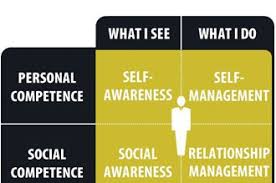 The four emotional intelligence model parts are based on a connection between what you observe and understand and what you do with yourself and others. It’s a case of seeing self-awareness and social awareness and doing self-management and relationship management. Here are practical examples from each category:
The four emotional intelligence model parts are based on a connection between what you observe and understand and what you do with yourself and others. It’s a case of seeing self-awareness and social awareness and doing self-management and relationship management. Here are practical examples from each category:
Personal Competence — Self-Awareness
- Self-confidence
- Awareness of your emotional state
- Understanding how other people’s behavior influences you and vice-versa
Personal Competence — Self-Management
- How you handle stress and frustration
- Knowing when to speak up and shut up
- Flexibility to roll with the punches and change as the situation demands
Social Competence — Social Awareness
- Picking up on the room’s mood
- Empathy with what others are going through
- Listening and really hearing what another person is saying about a situation
Social Competence — Relationship Management
- Clearly expressing ideas and information
- Getting along well with others and effectively handling conflict
- Using awareness of others’ experience to successfully manage interactions
How Emotional Intelligence Appraisals are Scored
The E-IQ appraisal method used in the Quick Book’s TalentSmart website examination works on a 0–100 point scale. The book’s authors, who developed the scale and the appraisal format, make it clear there’s no such thing as mastering emotional intelligence skills. They unequivocally state you can work and improve E-IQ skills no matter where you sit on the scale. However, they validate the scoring scale and process by using the numbers as relative to a large population they’ve studied and assessed.
Their base-population mass is in the multi-thousands, and the appraisal site on the TalentSmart website works on an algorithm that constantly monitors incoming appraisal scores and places subjects according to their percentage in the overall system. Generally, appraisal scores in the 80-90 percentiles indicate higher emotional intelligence whereas lower scores in the 50-60 percent range indicate an inferior E-IQ makeup compared to the entire population. Their site gives these suggestions according to score:
90-100 % — A strength to capitalize on
80-90 % — A strength to build on
70–80 % — With a little improvement, this could be a strength
60–70 % — Something you should work on
50-60 % — A concern you must address
The TalentSmart web-based appraisal site doesn’t say what you should do if you fall below the 50 percent mark. I’ll leave that, but if you’d like to take the E-IQ Appraisal, here’s what to do. I’ll walk you through my TalentSmart experience and give you the secret handshake. You can go onto the site and read my actual appraisal report. Some parts were pretty good and one area, well… I need a bit of work.
The TalentSmart Emotional Intelligence Appraisal Process
The first thing I have to tell you is if you want to take your own TalentSmart E-IQ appraisal, it’ll cost you money. They’re a business, after all, and businesses need to be profitable. However, it’s not that much and you can economize or even cheat if your emotions allow it.
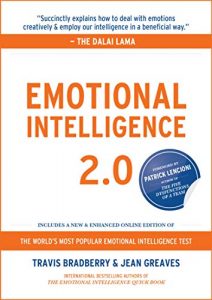 I bought the hardcover version of The Emotional Intelligence Quick Book. (By the way, it’s revised as Emotional Intelligence 2.0 and written by the same bunch that developed the highly-successful business book The One Minute Manager.) I didn’t pay full pop for the book, though. I found it for ten bucks at a used book store, and it was in pristine shape.
I bought the hardcover version of The Emotional Intelligence Quick Book. (By the way, it’s revised as Emotional Intelligence 2.0 and written by the same bunch that developed the highly-successful business book The One Minute Manager.) I didn’t pay full pop for the book, though. I found it for ten bucks at a used book store, and it was in pristine shape.
To access the appraisal exam, you need to take a unique code from the inside of the dust cover. My code is 4859BQEU. It’s a one-use-only code, and you can’t pirate it to do your own thing. You’ll have to buy a book to get your own code or find a creative way of getting a pass-code. I’ll leave that to you.
Next, you open TalentSmart web portal at www.eiquickbook.com. Follow the directions, enter the code and you’re in. If you use my code, 4859BQEU at www.eiquickbook.com , it’s easy to follow the prompts and see what I’m emotionally made of. If you do your own appraisal, the process is fairly fast… but it’ll make you think.
Once you’re done, you’ll get a nice pdf printout of your E-IQ assessment and their rating of where you emotionally fit with the world’s population. I think the process is reasonably reliable. Like many things, you’ll get out of it what you put into it. Reading the Quick Book alone is well worth the investment if you’re into self-help and personal development.
Okay, so how did I rate on the Emotional Intelligence appraisal scale? Well, I won’t give you exact numbers in this post, but you’re more than welcome to go onto the TalentSmart www.eiquickbook.com site, enter 4859BQEU and read them yourself. What I will say is I scored strong on the Personal Competence areas of Self-Awareness and Self-Management. I also did quite well in the Social Competence area of Relationship Management.
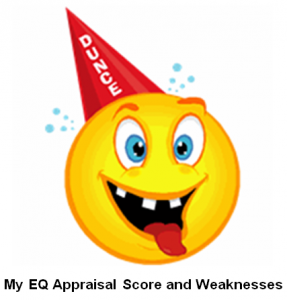 Where I dropped was the Social Awareness segment. It’s clear that while I’m aware of what others are up to, I could use a little more empathy. Deep down I know they’re right, and it’s true. I have little time for certain people. It’s a leftover cop-thing where my give-a-shit tank runs low.
Where I dropped was the Social Awareness segment. It’s clear that while I’m aware of what others are up to, I could use a little more empathy. Deep down I know they’re right, and it’s true. I have little time for certain people. It’s a leftover cop-thing where my give-a-shit tank runs low.
Anyway, the report let me off nicely with a detailed action plan and some words of wisdom. It told me that improving my emotional intelligence is a flexible skill that I can easily learn. Rather than being a fixed value like my IQ, my EQ is a plastic parameter where I can work on my weaknesses by applying my strong emotional traits.
The process takeaway, for me, was that people build on their character when they’re aware of things like how emotional intelligence affects you and others. It’s a matter of understanding what EI is and how you can use it as a life skill. But to make it work, you need a strong motivation to learn and change. You require consistent practice on your new behaviors. And, it helps to have feedback.
Are you up to the emotional workout challenge and want to find out your E-IQ score? Try it. Let me know what you think about emotional intelligence. If you take the appraisal, tell me how you made out.


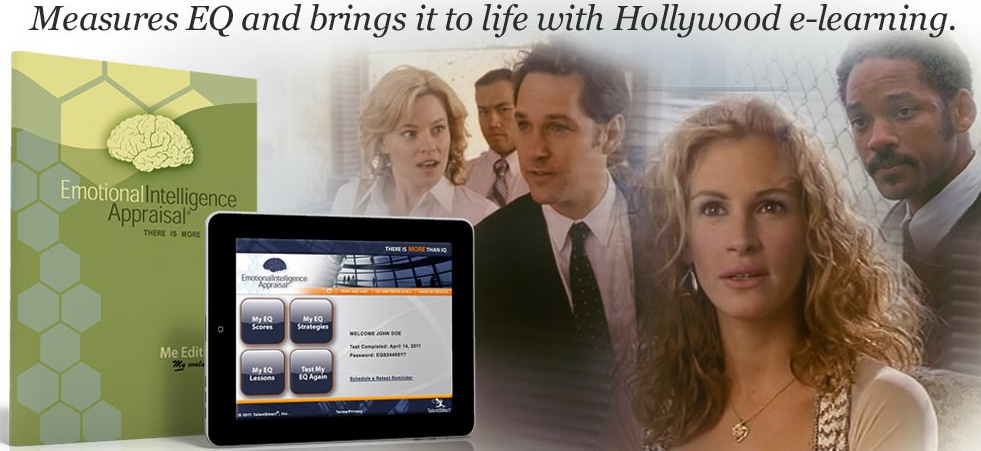
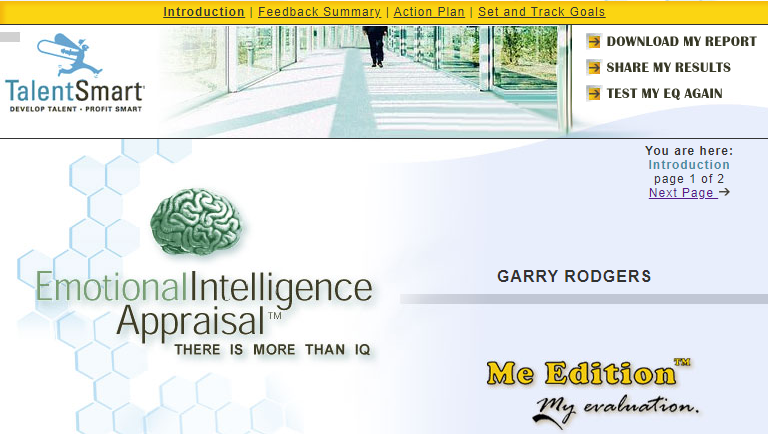
Wow. You never cease to amaze me, Garry. I love that you’re always striving to better yourself and enrich your life. I’m low on empathy for certain people, too. Must be a Libra thing.
Sometimes I amaze myself too, Sue. Like, I’m amazed I’ve survived this long and don’t get called on all the BS I write. On the serious side, I bet if you take this test, your score will be very similar to mine. Probably a Libra thing, for sure, and I’m with you on who the “certain people” are.